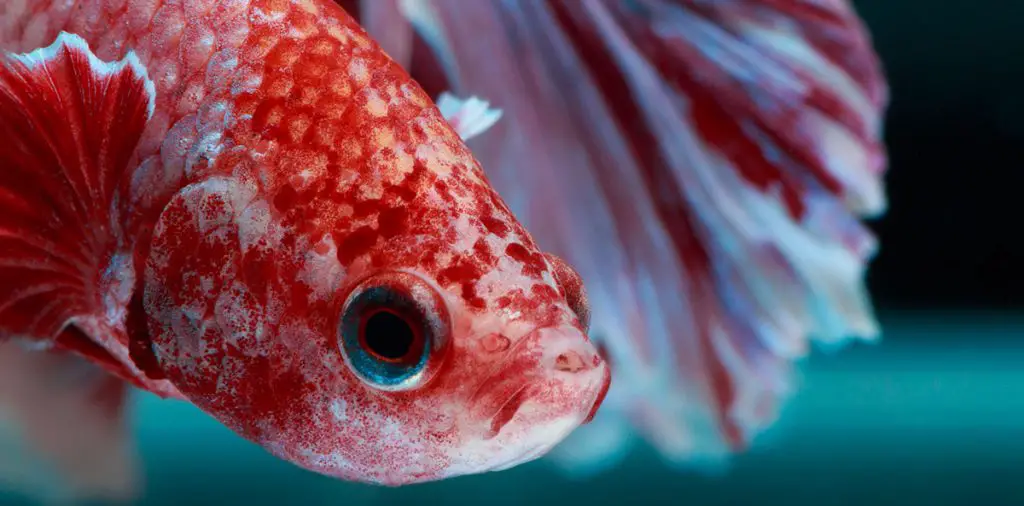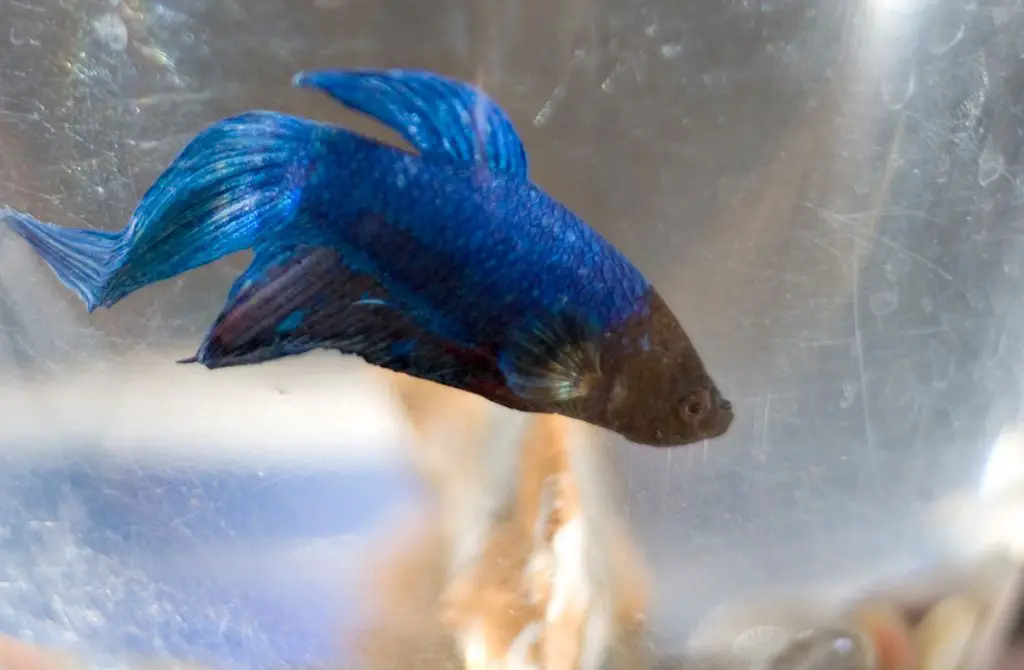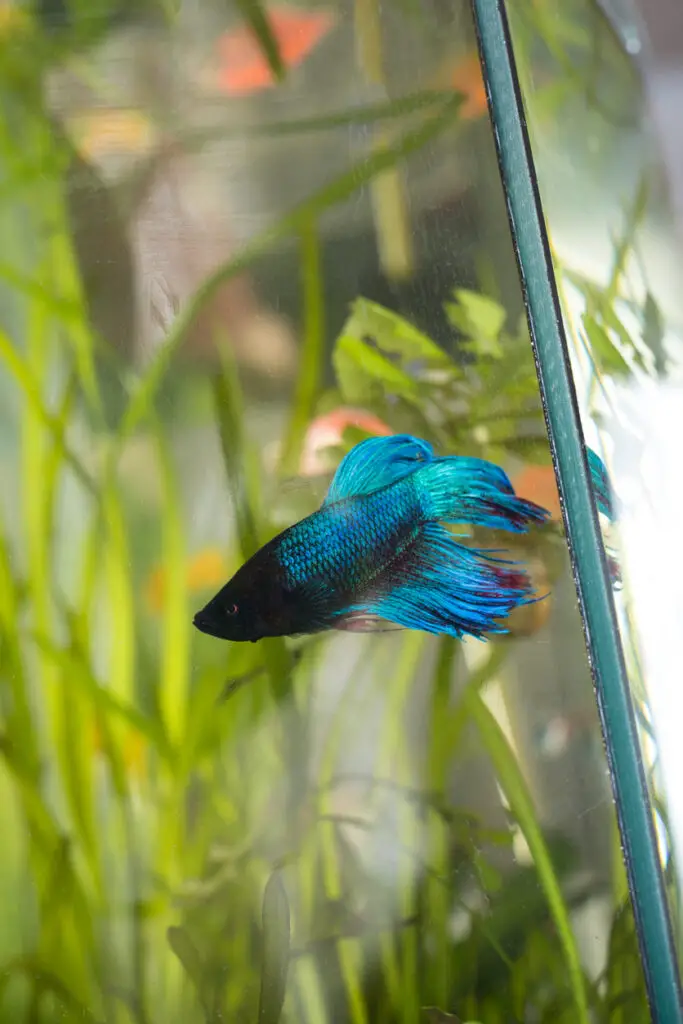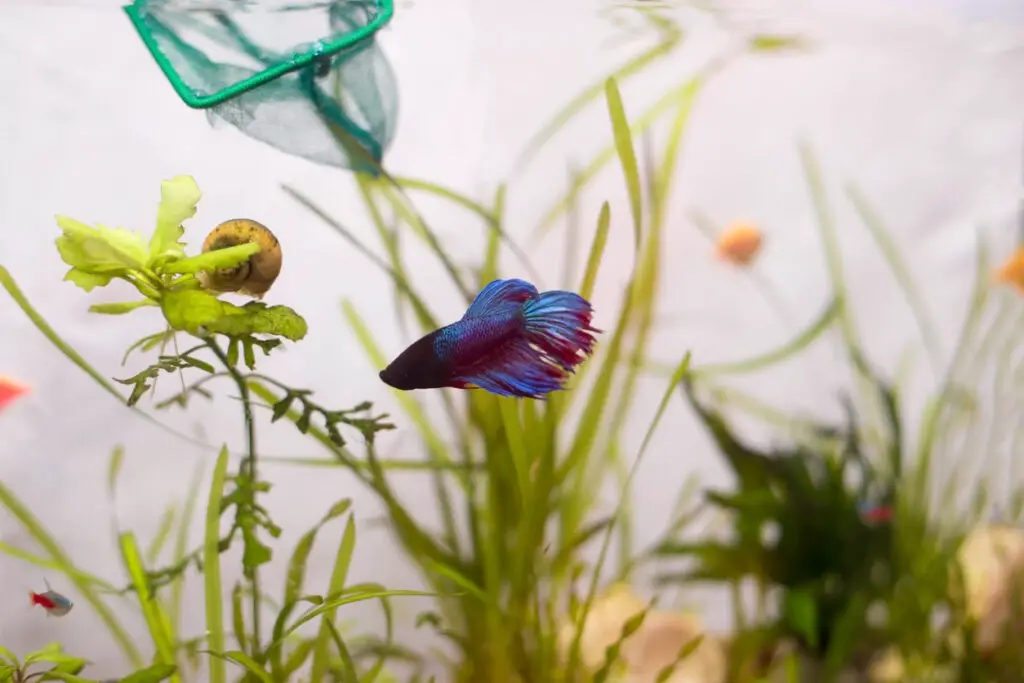Choosing the best water for your betta fish is only half the battle. If you expect your new betta to live more than a few days, maintaining the water is crucial.
The water chemistry is going to change over time unless you do a 100% water change every day. This is not a viable option because:
- Each time you change the tank water, the fish loses some of its protective slime coat. This increases the risk of disease and death.
- Each time you net a fish, you run the risk of damaging its slime coat, fins and scales. This will also increase the risk of illness.
- Partial water changes are also stressful to the fish. Stress leads to immune system break down that can kill your betta. They will also dart and may bump into other items in the tank, which leads to injuries.
Below you’ll find out guide on maintaining the best water conditions for your betta fish.

Water Testing Strips: An Essential Part of Betta Water Care
To keep water changes down, use a test kit once a week to check water chemistry.
One or more levels may differs from optimal levels shown later in this article.
Follow the troubleshooting guide to correct the problem. Use water changes only as a last resort.
There are three water testing products that I use and recommend:
- Tetra EasyStrips Ammonia Aquarium Test Strips – With experience, you will learn the signs of ammonia poisoning. Until then, use the strips to keep your fish safe and healthy.
- Tetra EasyStrips 6-in-1 Aquarium Test Strips – I use these to make sure water going in the fish tank is free of chlorine.
- API Freshwater and Saltwater Aquarium Test Strips – These are my “go-to” for routine testing in both new and established tanks.
Choosing a Siphon for Your Betta Tank
Water changes should be a rare event. However, it is still important to have a good quality siphon on hand.
Never use a siphon that isn’t certified safe for use in an aquarium.
Other siphons may have metals and solvents in them that are deadly to fish.
Author Note: Most aquarium cleaners on the market use a check-ball to start the siphon action. Shaking the siphon up and down in the water can be extremely disruptive, especially in a tank that holds less than 3 gallons.
Squeeze ball siphons can also be very disruptive. I use a battery powered aquarium cleaner because they do not move the water as much.
Water Conditioners And Modern Betta Aquariums
Regardless of why you need to add new water to the tank, always use the proper amount of water conditioner as specified by the manufacturer.
Municipal water supplies are treated with chemicals, such as chloramine, that are deadly to bettas.
Water conditioners such as Jungle’s Start Right (my absolute favorite for decades) will neutralize these harmful chemicals.
Some water conditioners will also isolate heavy metals and prevent them from circulating where the fish live. Since water changes are always stressful to the fish, a water conditioner that stimulates slime production is also very helpful.

How and When to Make Water Changes for Betta Tanks
Unless the tank needs cleaning to remove algae or other gunk, it is best to avoid water changes.
Even then, you can use a battery powered siphon that will let you put filtered water back in the tank. The water chemistry itself is best adjusted via other means noted in the troubleshooting guide below.
Top Tip: If you must remove water from the tank, always try to take it from the lower levels of the tank. This will help remove debris and other toxins that tend to settle in the water over time.
When your tank is properly balanced, all you should need to do on a weekly basis is top off the water lost from evaporation. This goes for a small one gallon tank all the way up to tanks that hold thousands of gallons.
Is There a Real “Best Water for Bettas?”
I can’t honestly say there is a “best water” for female and male bettas, let alone any other fish.
There is, however, an optimal water chemistry for bettas.
Regardless of the kind of water you start off with, paying attention to the correct water parameters is vital.
Now let’s take a deep dive into the best water chemistry for betta tanks; how to obtain it, and how to keep it.
Best Water Chemistry for Bettas and Troubleshooting Guide

pH
Betta water should remain between 6.5 – 7.5.
Alkaline water increases damage from ammonia. I try to keep my betta water pH between 6.6 and 6.8.
Use products such as API’s pH Up and pH Down to adjust as needed.
General Hardness
dH under 25.
Author Note: Bettas must maintain a balance of ions, minerals, and other molecules within their bodies. If the water is too hard or too soft for bettas, they will die in just a few days.
I recommend API’s water softening pillows for hard water. Use Seachem Equilibrium for water that is too soft.
Carbonate
These are minerals that help stabilize the pH levels of the water.
High levels are generally better than low ones.
If you need to adjust the pH, however, it can take several days to reach and maintain the new pH.
Water Temperature
Bettas require water that is 76 – 80 degrees Fahrenheit.
Salinity
Bettas are freshwater fish and cannot live in salt water.
They can tolerate small amounts of aquarium salt.
It is up to you if you want to use this additive for disease prevention.
Tannins
These molecules make the water softer and lower the pH. In nature, bettas live in tannin rich water.
You can use cattapa leaves, almond bark, or driftwood to add tannins to the water.
Ammonia
Zero! Ammonia is extremely toxic to tropical fish. It is excreted through their gills and stool. Leftover food also breaks down into ammonia.
Let’s say you detect ammonia in the betta fish tank, but don’t see signs of fish distress.
Add about ½ cup of zeolites to a nylon stocking. Zeolites transform ammonia into nitrite. Put the stocking near (without blocking) the filter inlet. This will ensure water circulates through the zeolite as quickly as possible.
If you see signs of distress, do a 50% water change and increase air flow into the tank. Use a bubble up filter to hold additional zeolites, plus a nitrite absorbing pad.
Once the levels remain at zero for a few days, take out the secondary filter and return air flow to normal.
Nitrites
Zero! In a tank with a well established nitrogen cycle, there should be no nitrites.
If you detect nitrites in an established tank, add a nitrite absorbing pad to the filter.
Flake food is notorious for decaying quickly into ammonia, which is converted into nitrites. Switch to pellets to avoid this problem and decrease algae buildup.
In an emergency, you can also do a 25% water change. Do not disrupt the gravel, or you will slow down the nitrifying bacteria that turn nitrite into nitrate.
Nitrate
Betta tanks should have nitrate levels of 10 – 20 ppm.
Nitrates are not as toxic to fish as nitrite. Their buildup, however, usually occur along with other water quality problems.
Top Tip: Since live plants use nitrate for food, they are useful for keeping the levels low.
In an emergency, you can also use nitrate reducing pads, or do a 25% water change.
If the nitrates are still high, wait at least 4 days before doing another partial water change. It will take a few days for the fish to calm down and adjust to any changes in water chemistry. What you think is a small change may be enormous to the betta.

Common Water Sources: When and How to Use Them
When it comes to choosing a type of water for your betta tank, keep an open mind.
Many “experts” do not take into consideration the damage to fish caused by pollution. As such, what used to be good options may not be the best for your fish.
- Tap Water – Water filters, nitrate pads, and conditioners may not be enough to ensure tap water is safe for your betta. Faucet water may contain everything from chemotherapy agents to industrial pollutants. There is no way to know what is in tap water, or how it will affect the fish.
- Bottled Spring Water – Bottled water may also be contaminated with everything from arsenic to other toxins. Bottled water is usually soft, however. It is a useful choice for new setups if your tap water is too hard for bettas.
- Distilled Water – I don’t recommend using distilled water in new setups unless you add sufficient minerals for the fish’s needs.
Due to water pollution problems, I do, however, recommend using distilled water periodically for topping off.
This is the only water that is free of heavy metals, pharmaceutical drugs, and other pollutants found in tap water and bottled water.
Use distilled water one out of every four top-offs to replace water lost through evaporation.
When I first started keeping fish as a hobby, I followed the cult of frequent water changes.
Over the years, I found out that fewer water changes work better. Learning how to adjust and manage water chemistry is a vital key to ensuring your betta remains healthy and happy.

Great article
I’m new to keeping betta mine are all female but this is my go to site great site full of easy to understand info wish you had a Facebook page
Hi Tracey! We actually do have a Facebook page – it’s collected some dust over the years but we plan on keeping it more up to date moving forward. Cheers!